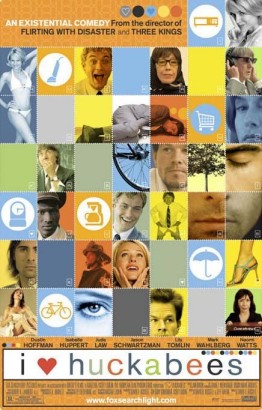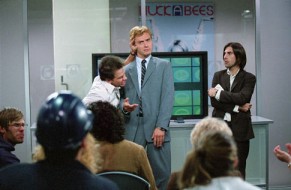|
I
Heart Huckabees
Sometimes
a film latches on so tightly that it becomes impossible
to look away. David O. Russell’s latest effort, I
Heart Huckabees is indeed a film of that ilk.
Both
polarizing and embracing at once, Huckabees is
utterly absorbing. The plot is seemingly basic, yet the
manner in which story is derived through relationships between
characters is entirely complex.
Confused?
You will be, for the most part, but hold on. Russell’s
film asks the questions that often coincide with meditative
constants that have always plagued mankind: “Is existence
a cruel joke?” “How am I not myself?”
and “What happens in a meadow at dusk?”
And so on, and so on. Ok, so the dusk one isn’t age
old, but you get the drift. Russell uses questions whose
answers eluded the greatest thinkers of our species and
molds them into a bright, insightful, yet engaging film
for wide audiences.
This
is not the first time a filmmaker has tackled these philosophical
musings on screen. Art house cinema is often fused to metaphysical
ponderings, but never before has it been so hilarious and
accessible, without undermining the content. This stems
from Russell’s assertion that extremes, in this case
“human drama” and “comedy,” are
not actually separate entities but instead two sides to
the same coin. One cannot exist without the other, and they
are tied together against their own will.
So what
about the film? Why is it called I Heart Huckabees
instead of “I Love Huckabees” as many would
assume?
What
I will divulge is that the film centers around a troubled
environmentalist named Albert Markovski (Jason Schwartzman),
whose sole purpose in life is to save nature through activism,
and bad poetry. Albert’s organization, the Open Space
Coalition, is working to preserve an endangered marsh at
risk of becoming the next installment of the Huckabees chain
of retail stores in the vein of Wal-Mart or Target.
His
approach is to work with the chain of superstores in an
attempt to accomplish both entities goals together. This
would insure happiness for all involved, right? Wrong.
Congruently,
we learn that Albert has decided to hire two “existential
detectives,” Vivian and Bernard Jaffe (Dustin Hoffman
and Lily Tomlin) after discovering their business card in
the pocket of a jacket loaned to him by a restaurant in
order to adhere to the eatery’s dress code. They take
his case, pro bono.
Albert
has been befuddled by three chance encounters with Mr. Mimieri
(Ger Duany), and he feels that these meetings are life’s
way of trying to tell him something substantial. He can’t
wrap his head around the significance, and wants the Jaffes
to sort this all out for him.
This
involves giving the Jaffes complete access to his life.
Vivian’s modus operandi is that of an analyst, peeping
in on him at all times, noting occurrences in astute detail
in hopes of finding a clue that will somehow connect the
dots.
Bernard,
on the other hand, delves deeper into Albert’s belief
system, sorting through the layers that make Albert who
he believes himself to be. His primary focus is on the infinite,
and the belief that all things are connected, whether they
appear to be on the surface or not.
This
isn’t a philosophy lesson, but Russell aptly touches
on the key principles necessary to glue the whole thing
together.
As the
Jaffes sift through the components that make up Albert’s
life, we are introduced to Huckabees public relations superstar
Brad Stand (Jude Law) and his Huckabees spokes model girlfriend,
Dawn Campbell (Naomi Watts). Brad
is working with Albert’s coalition as a PR coup, all
the while keeping Huckabees expansion goals on track. His
interest in usurping Albert in all ways possible leads him
to hire the Jaffes as well, much to Albert’s dismay.
The more we learn about Brad’s bravado laden personality,
the more we understand Albert’s feelings of vilification.
Mark
Wahlberg plays Tommy Corn, a post-9/11 firefighter who believes
that petroleum is destroying the world, and is also seeking
enlightenment through existential detective work. Tommy
questions, “Why is it people only ask themselves deep
questions when something really bad happens?” This
is not only humorous, but poignant. His emotions, as do
many others’, run deeper than he can comprehend, and
not understanding troubles him.
Corn’s
“dismantling,” the breaking down of who we believe
ourselves to be in effort to discover who we truly are,
has been disrupted by the writings of French philosopher
and ex-Jaffe pupil, Caterine Vauban (Isabelle Huppert).
Well
deserved praise for Wahlberg’s performance has already
mounted, yet it seems more appropriate to applaud the entire
cast equally. Everyone rises to the challenge here, and
let’s face it, this subject matter is no easy feat
to harness let alone make charming.
There
is merit in comedy that not only invokes laughter, but connects
us to the underlying humanity within these absurd characters.
It is intended that we question ourselves and the film,
even as it unfolds. When is the last time you did that at
the multiplex?
In Huckabees,
joy and suffering are one in the same, and after all, what
is laughter if not a mask for pain? What is a joke, other
than a cry for attention? The inability to access these
emotions is often the consequence of being unable to see
things at face value.
This
may be why the film is pronounced I Heart Huckabees. We
see a heart in the title, but human nature immediately links
the image of a heart to the emotion we know as love, and
this helps us visualize the differences and similarities
between the symbol and the emotion at once. Sometimes we
find comfort in the façade of symbols. Other times
it helps to step back from all the icons, clear your head,
take a look at life for what it truly is, and just laugh.
Either
way, I heart this film.
Rating:

|







